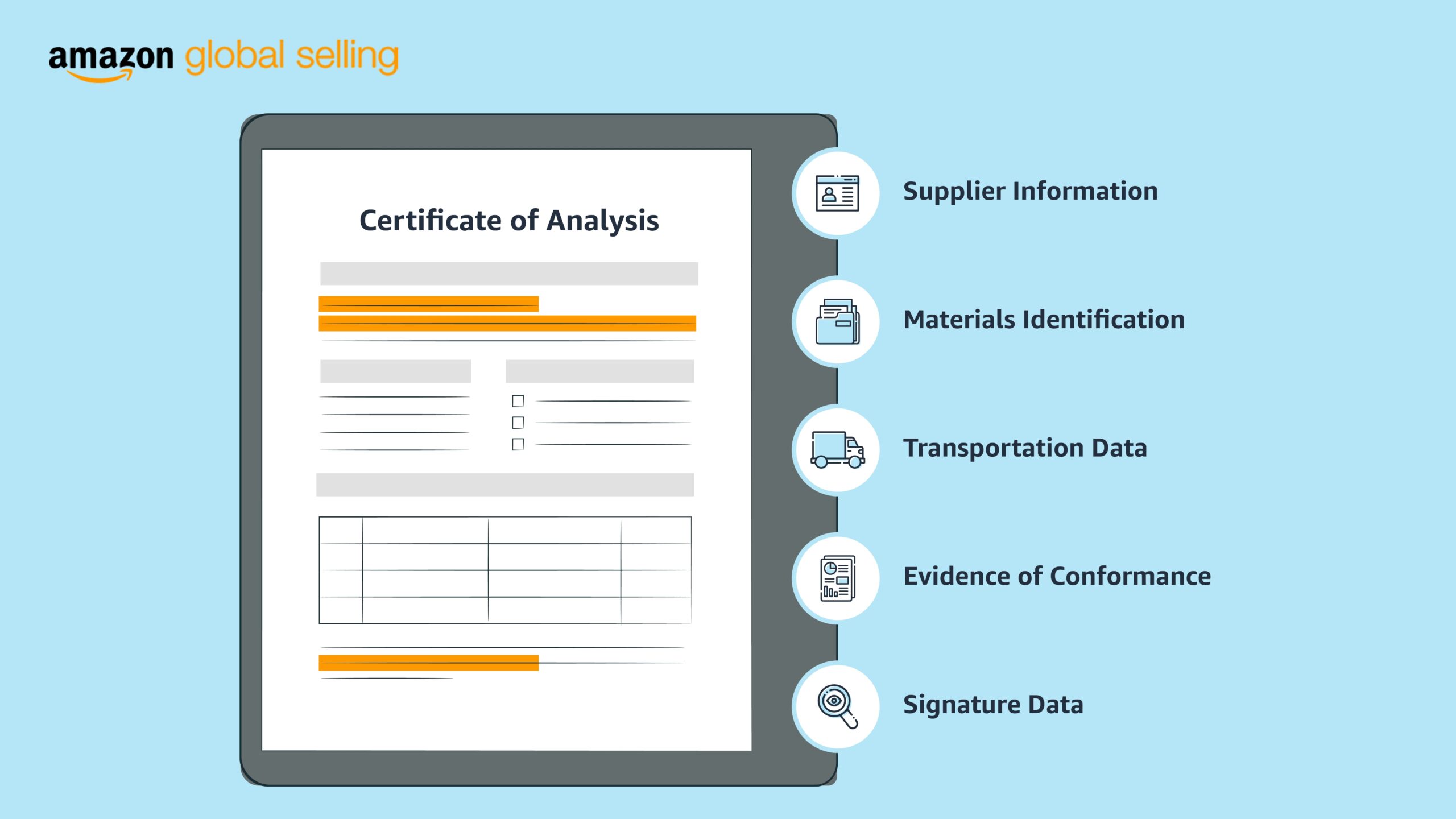If you’re planning to sell supplements, weight loss products, or adult consumables on Amazon, one of the most important documents Amazon might request from you is the Certificate of Analysis (COA). It’s more than just a formality—it’s a crucial piece of proof that validates your product’s safety, quality, and compliance.
In this blog, we’ll break down everything you need to know about COAs, where to get them, and why ensuring their authenticity can make or break your Amazon business.
What is a Certificate of Analysis (COA)?
A Certificate of Analysis (COA) is a document issued by a manufacturer or third-party lab that verifies the product’s composition, potency, and safety. It confirms that the product meets the required specifications and regulations.
Key details included in a COA:
- Product name & batch/lot number
- Manufacturer or lab name and contact info
- Date of testing
- Analytical results (ingredients, percentage content, microbial analysis, heavy metal levels, etc.)
- Signature and seal of the authorized person/lab
Why Does Amazon Require a COA?
Amazon wants to ensure that human consumables—especially those related to health, wellness, and intimacy—are safe and legally compliant before they hit customer doorsteps. The COA is a major requirement in these categories:
- Dietary supplements
- Weight loss pills or powders
- Adult enhancement or wellness products
- Anything ingested or topically applied with a health claim
Amazon may request a COA during:
- Category ungating
- ASIN creation
- Product verification (random checks)
- Account health investigations
Importance of a COA for Supplements & Adult Products
Selling in restricted or sensitive categories like supplements and adult consumables puts you under Amazon’s microscope. A valid COA:
- Confirms your product doesn’t contain banned or dangerous substances.
- Verifies ingredient potency matches what’s claimed on the label.
- Helps avoid customer complaints related to health issues.
- Prevents regulatory risks (FDA, FTC, etc.).
- Proves you’re sourcing from a reputable supplier.
Amazon takes compliance seriously, and submitting a fake or altered COA can result in:
- Immediate listing removal
- Account suspension
- Permanent ban for document forgery
Where Can You Get a Valid COA?
There are two safe sources for getting a COA:
1. From Your Supplier or Manufacturer
Before placing your order, always confirm that your supplier can provide a valid and original COA for the product or batch.
Checklist:
- Is the COA batch-specific?
- Is the testing lab mentioned?
- Is the document signed and dated?
- Are the ingredient specifications and safety tests clear?
Avoid suppliers who hesitate or delay COA sharing—it’s a red flag.
2. From an Independent Third-Party Lab
If the supplier doesn’t provide a COA, or if Amazon flags the one you submitted as insufficient, get your product tested yourself.
Trusted labs include:
- Eurofins Scientific
- NSF International
- SGS
- Intertek
- UL
- Micro Quality Labs
These labs can test your product and issue a compliant COA based on FDA/USP standards. Always choose labs accredited by ISO/IEC 17025.
What to Ensure Before Submitting a COA to Amazon
When submitting a COA to Amazon, ensure:
- The product name on the COA matches your Amazon listing.
- The manufacturer or lab name is clearly visible and real.
- No data is edited, removed, or handwritten.
- The lab is independent and accredited.
- The COA is in PDF or clear image format.
- It is recent (within the last 12–18 months, or specific to the production batch).
The Risks of Submitting a Fake COA
Some sellers try to cut corners by submitting edited, reused, or fabricated COAs. That’s a critical mistake.
Amazon may:
- Permanently ban your account for falsification.
- Notify federal authorities if public safety is at risk.
- Blacklist your brand and listings across multiple categories.
Final Tips for Sellers
- Always ask your supplier for a COA before ordering.
- Verify the lab’s legitimacy.
- Do not assume one COA works for multiple batches.
- Keep all original documents backed up and timestamped.
- Use tools like Bettersell or inventory software to organize your compliance documents.
Conclusion
If you’re entering Amazon’s health & wellness space—especially in high-risk categories like supplements, weight loss, or adult consumables—you must treat compliance seriously. The Certificate of Analysis (COA) is a non-negotiable requirement that can save you from suspensions, customer complaints, and legal issues.
Do your homework, work with verified labs or suppliers, and submit only original documents to maintain your seller credibility.

Leave a Reply